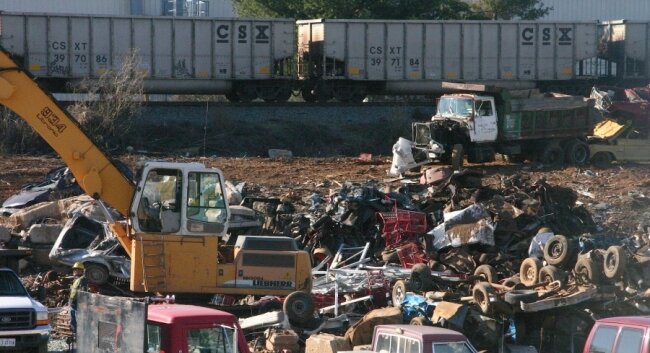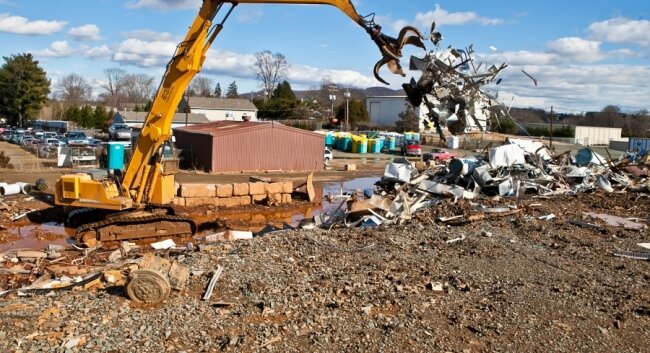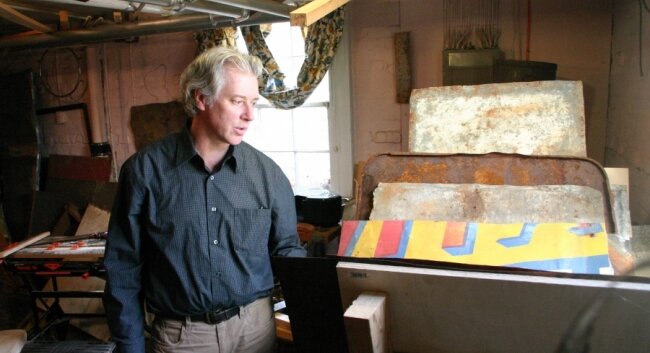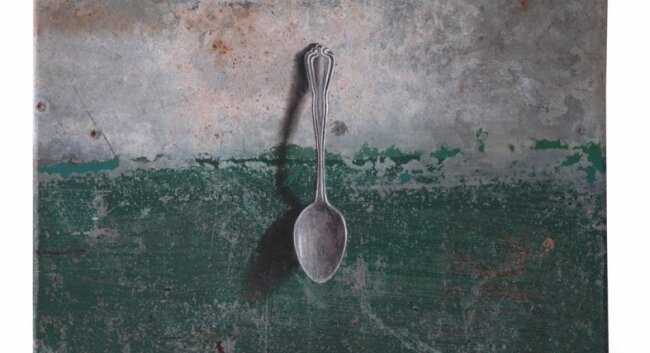Big scrap: Artists fight for their right to pick
-
 Roanoke-based Cycle Systems bought Coiner's Scrap Iron and Metal on Meade Avenue in 2008, where one person's junk sometimes becomes another person's work of art.dave mcnair
Roanoke-based Cycle Systems bought Coiner's Scrap Iron and Metal on Meade Avenue in 2008, where one person's junk sometimes becomes another person's work of art.dave mcnair -
 Citing liability concerns, and presence of machinery like this, Cycle System shut down walk-in service.Will Walker
Citing liability concerns, and presence of machinery like this, Cycle System shut down walk-in service.Will Walker -
 Artist Mike Fitts, seen here in his basement workshop, says his work depends on finding varieties of scrap metal.Dave McNair
Artist Mike Fitts, seen here in his basement workshop, says his work depends on finding varieties of scrap metal.Dave McNair -
 Fitts painted "Spoon on a Horizon" in 2007 using scrap metal from Coiner's. It went on to beat out 350 entries for the Mid-Atlantic New Painting exhibit at the University of Mary Washington Galleries.Courtesy Mike Fitts
Fitts painted "Spoon on a Horizon" in 2007 using scrap metal from Coiner's. It went on to beat out 350 entries for the Mid-Atlantic New Painting exhibit at the University of Mary Washington Galleries.Courtesy Mike Fitts - click to view more photos
If you've ever hauled junk to the Meade Avenue place long known as Coiner's Scrap Iron and Metal, there's a chance that your old gutter, gear, appliance, or tin slab never got melted down, that it actually became part of a custom lamp, a sculpture, a reinvented machine, or a piece of "found art" that might hang in a fancy gallery in Washington, D.C., or even in the home of a rock star.
For decades, local artists, artisans, and junkyard combers have been going to Coiner's on Saturday mornings, perusing the heaps of iron, steel, and tin scrap for anything that might be useful or attractive for their purposes.
But that came to a halt several weeks ago, temporarily at least, outraging some local scrap hunters.
Indeed, the family owned business that started at the turn of the century had become a kind of Saturday morning "breakfast club" for scrap hounds over the years, says one long-time patron.
"I remember going there with my Dad when I was about eight-years old," says Peter Farrell, a craftsman who has purchased metal scraps for works of art and high-end custom lighting projects. "I've bought thousands of dollars of metal from there over the years."
What's more, Farrell says he's met interesting people at the scrapyard, including a NASA scientist, a British guy who used to work in a Rolls Royce factory, and artists like Michael Fitts, a successful painter who uses scrap metal as a surface medium.
Farrell says that the scrapyard was like a goldmine for some people, a place where one could find beautifully designed forged metal parts that had been lying around for decades.
"These are amazing people that go through junkyards and find stuff people have discarded to give them a second life," says Farrell.
However, when long-time owner Preston Coiner sold the business in 2008 to a corporate recycler, Roanoke-based Cycle Systems, the breakfast club-goers feared the company would put an end to their scavenging. Indeed, according to Fitts, over the last few years the people running the Charlottesville operation have made it "more and more difficult and unpleasant to buy scrap."
In December, the Charlottesville location announced that it was pulling the plug on walk-in sales.
"Without a scrapyard like that, you have to use a distributor, and that's expensive," says Farrell. "You also have to buy in bulk. But if you're an artisan or artist, you're looking for quality, not quantity."
Fitts says he wrote the owner of Cycle Systems a letter when the business changed hands and received assurance that it would stay open for walk-in buyers. Fitts, whose realistic painted objects on metal are familiar to local gallery goers, has seen his worked exhibited at Washington's Corcoran Gallery. Privately, his paintings have sold for thousands; rock star Dave Matthews and best-sell author John Grisham have Fitts paintings hanging in their homes.
When Preston Coiner was still running the place, Fitts says, the guys there knew him by name and it was a "nice small-town operation." In fact, he says it was Coiner who suggested he come to the yard. After seeing his paintings at a local gallery, Fitts says Coiner wrote him a letter and told him about his scrap yard.
For Fitts, it was a career changer. At the time, it was difficult to find the scrap metal he wanted. When he discovered Coiner's, Fitts says it opened up more possibilities for his work.
But since Cycle Systems took over they have been generally "very unpleasant and short" with artists and scavengers like him, he says.
"Cycle Systems managed to destroy everything that was great about that scrap yard," says Fitts. "They slowly strangled it to death by closing the yard to the public more and more on the Saturdays that they were open."
Cycle Systems CEO Jay Brenner, responding to such concerns in an interview last month, says he hadn't known that his Charlottesville operation had been closed down to walk-ins like Fitts and that his company has always been "big into art."
"We've even commissioned artwork," says Brenner.
Cycle Systems, too, is a family owned business, and Brenner is the great-grandchild of one of four brothers who started the scrap business in the early 20th century. In Lynchburg, the company has a modern shredding operation that processes automobiles and bulky steel appliances into small chunks of metal at the rate of 60 tons per hour. Including Charlottesville, the company operates nine facilities throughout Virginia.
Indeed, scrap yards are no longer quaint community outposts for discarded items– it's big business. In 2011, according to industry analysts, scrap metal prices were at "near historic highs." The stuff has become so valuable, especially in other parts of the world, that authorities in the UK, for instance, have referred to metal theft as a national "epidemic." Thieves are even stealing park sculptures. In Arizona, crooks are lifting air-conditioners and copper pipes from homes, copper wiring from street lights, and even plaques from local memorials.
Fitts says that scrap tin was about 5 cents a pound when Coiner ran the place, but as soon as Cycle Systems took over the price went up to 25 cents a pound.
Brenner says there were some liability concerns at the Charlottesville location, as many of the artists and walk-ins would climb about on scrap heaps in "flip-flops" while heavy machinery was in operation all around them.
"They didn't want customers to get hurt," explains Brenner. Indeed, when a Hook reporter showed up at the yard to take photos, he was told that he couldn't walk around the yard without a hardhat and steel-toed shoes.
"But I didn't realize they'd stopped the walk-in service," says Brenner, "so we started it up again."
Brenner says the scrap yard will now be open one Saturday a month for artists and walk-ins– from 12 to 2pm beginning in February.
"But we can't have them climbing all over the piles," he says. "They will need to sign a release, and wear hard-soled shores."
Farrell says he remains curious about that attitude, given that the breakfast club-goers are far more experienced at perusing the yard than the folks who come to drop off scrap. Still, he's happy the company had a change of heart.
"I can't tell you what this means to us," says Farrell, learning that Brenner had re-started the walk-in service, even if it would just be one Saturday a month. "There really would have been nowhere else for us to go."
Fitts, however, isn't ready to believe the place will re-open to folks like him.
"I'll believe it when I see it," he says.
~
Original headline: "Creative metal: Scrap-hunting scrapped, then unscrapped"
7 comments
It really is sad what's become of that place. One more bit of small town charm and community sucked away by a corporate giant that doesn't want to do business with the little guy. I've taken many piles of junk metal there and have seen numerous items tossed into the pile that I would have paid far more than scrap value to retrieve, but have been forbidden to do so. One Saturday a month does nothing really to change that.
Given that Michael Fitts primarily paints inanimate objects, I don't think "life-like" is the adjective you want. Perhaps "realistic" would be a better choice.
Charlottesville is so resistant to any kind of change for good or bad. The place is an eyesore. Get rid of the junk and built some more multi-million dollar Coran-Condos for the 1-percenters already.
Blame the Lawyers simple as that
Indeed, great suggestion, LP. We've taken your advice.
Dave
Yes, the scrap yard has turned into a bad place. The people who work there are unpleasant (In the office). They don't treat people right. The place gets busier every day and they get worse...
Yeah, what's a few more hours for these workers. When you already work 5 1/2 days a week why not add a few more hours away from family - the kids won't ever remember that.